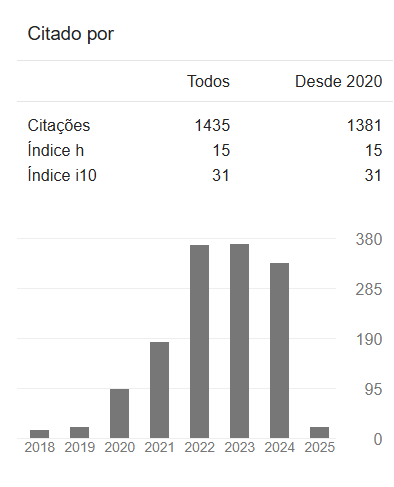YOUTH AND ADULT EDUCATION IN THE PERSPECTIVE OF TWO SCHOOLS IN CUIABÁ
DOI:
10.23926/RPD.2526-2149.2019.v4.n2.p834-851.id538Keywords:
Public Policies, Opportunities Youth and Adult EducationAbstract
This article is part of a larger research developed by the Graduate Program in Teaching of UNIC - University of Cuiabá in partnership with the Federal Institute of Education, Science and Technology of Mato Grosso-IFMT. The qualitative research aims to analyze the way in which the curricular approach of this teaching modality takes place, seeking to highlight the student perception about the structural issues related to the educational sphere pertinent to the curriculum that permeates the formative process of the students of Youth Education. Adults (EJA) in two public schools in the city of Cuiabá. We chose as methodology the use of documentary and bibliographic sources, and the data collection was performed by applying a socioeconomic questionnaire to the students of the locus of the research, using the focus group as a research technique. As a result it was possible to understand the current formative intention of EJA in the schools in focus, to rethink the theoretical and practical dimensions regarding the curriculum developed in EJA in the research schools. We have noticed that, over time, the teaching modality on screen has been devalued, since the public policies directed to it have no concern regarding its specificities, because the social actors that compose them are individuals who do not They had the opportunity to complete their studies at a regular age, which should be taken into account in their formative process, albeit late.
Downloads
Metrics
References
APPLE, Michael. Ideologia e currículo. 3 ed. Porto Alegre: Artmed, 2006
ARANHA, Maria Lúcia de Arruda. História da educação. 2. ed. São Paulo: Moderna.
ARROYO, Miguel G. “Os educadores, seus direitos e o currículo”. In: MOREIRA, Antonio Flávio e ARROYO, Miguel. Indagações sobre o currículo. Brasília: Departamento de Política de Educação Infantil e Ensino Fundamental, nov. 2006.
BELLO, José Luiz de Paiva. Movimento Brasileiro de Alfabetização – MOBRAL.
História da Educação no Brasil. Período do Regime militar. Pedagogia em foco, Vitória 1993, Disponível em < http://www.pedagogiaemfoco.pro.br/heb10a.html>. Acesso em: 03 de julho de 2019.
BOGDAN, Robert; BIKLEN, Sari. Investigação Qualitativa em educação: uma introdução à teoria e aos métodos. Porto, Portugal: Porto Ed., Coleção Ciências da Educação, 1994.
BRASIL. Lei de Diretrizes e Bases da Educação Nacional. – LDB. Lei Nº 9394/96. Brasília, 2007.
BRASIL. Ministério da Educação. Programa de Integração da Educação Profissional ao Ensino Médio na Modalidade de Educação de Jovens e Adultos – Proeja: Documento Base. Brasília-DF: MEC, fev. de 2006.
BRASIL. Constituição Federal BRASIL. Programa Brasil Profissionalizado. Brasília. 2007. Disponível em:http://portal.mec.gov.br/index2. php?option=com_content&view=article&id=12325&Item id=663 Acesso em 15/07/19.
FREIRE, Paulo. Pedagogia da Autonomia. saberes necessários à prática educativa. São Paulo: Paz e Terra, 2003.
FREIRE, Paulo. Pedagogia do Oprimido. Rio de Janeiro: Paz e Terra, 2005, 42. ed.
FREIRE, Paulo. Pedagogia da Autonomia: saberes necessários à prática educativa. São Paulo: Paz e Terra, 1996.
GHIRALDELLI JUNIOR, Paulo. História da educação brasileira/Paulo Ghiraldelli JR. 2. ed. São Paulo: Cortez, 2006. Brasília, 1998.
LAKATOS, Eva Maria; MARCONI, Marina de Andrade. Metodologia Científica. 26. ed., São Paulo: Atlas, 1991.
MARX, Karl.; ENGELS, Friedrich. A Ideologia Alemã. Tradutor Luis Cláudio de Castro e Costa. Martins Fontes: São Paulo, 2002.
LÜDKE, Menga; ANDRÉ, Marli. Pesquisa em Educação: abordagens qualitativas. São Paulo, EPU, 1986.
MACHADO, Lucília Regina de Souza. Diferenciais inovadores na formação de professores para a educação profissional. Revista Brasileira da Educação Profissional e Tecnológica, Brasília, v. 1, nº 1, 2008. DOI: https://doi.org/10.15628/rbept.2008.2862
MCLAREN, Peter. Multiculturalismo crítico. São Paulo: Cortez, 1999.
MINAYO, Maria Cecília de Souza. (org.). Pesquisa Social. Teoria, método e criatividade. 18 ed. Petrópolis: Vozes, 2001.
MINISTÉRIO DA EDUCAÇÃO. Diretrizes Curriculares Nacionais Gerais da Educação Básica/ Secretaria de Educação Básica. Diretoria de Currículos e Educação Integral. Brasília: MEC, SEB, DICEI, 2013. Disponível em: http://portal.mec.gov.br/docman/julho-2013-pdf/13677-diretrizes-educacao-basica-013-pdf/file Acesso em 15-07-2019.
MOREIRA, Antonio Flávio Barbosa; SILVA, Tomaz Tadeu. (Org.). Currículo, cultura e sociedade. 2. ed. São Paulo: Cortez, 1997.
MOREIRA, Antônio Flávio Barbosa Moreira; CANDAU, Vera Maria (Orgs.). Indagações sobre currículo: currículo, conhecimento e cultura. Ministério da Educação. Secretaria de Educação Básica. Brasília, 2007
MORGAN, D.L; KRUEGER, R. A. Quando usar grupos de foco e por quê. Em: Grupos de foco bem sucedidos: avançando o estado da arte. [s.l.] Sage Focus Editions, 1993.
OLIVEIRA, Inês Barbosa de. Reflexões acerca da organização curricular e das práticas pedagógicas na EJA. Educ. rev. [online]. n.29, p.83-100,2007. DOI: https://doi.org/10.1590/S0104-40602007000100007
OLIVEIRA, Inês Barbosa de. Organização curricular e práticas pedagógicas na EJA: algumas reflexões. In: PAIVA, Jane; OLIVEIRA, Inês Barbosa de. (Orgs.) Educação de jovens e Adultos, Petrópolis: DP et Alii, 2009.
OLIVEIRA, Claudimercia Lima de. Descortinando a EJA e suas práticas educacionais: o papel da educação de jovens e adultos no Brasil como modalidade diferenciada de ensino e emancipação dos sujeitos. Bahia. 2015.
PAIVA, Vanilda Pereira. Educação popular e educação de adultos. 5. ed. São Paulo: Loyola, 1987.
Downloads
Published
How to Cite
Issue
Section
License
Copyright (c) 2023 A Revista Prática Docente tem o direito de primeira publicação

This work is licensed under a Creative Commons Attribution-NonCommercial 4.0 International License.
Authors who publish in this journal agree to the following terms:
- Authors retain the copyright and grant the journal the right of first publication, with the paper simultaneously licensed under the Licença Creative Commons Attribution allows the sharing of the work with acknowledgment of authorship and initial publication in this journal.
- Authors are authorized to take additional contracts separately, for non-exclusive distribution of the version of the work published in this journal (e.g. publish in institutional repository or as a book chapter), with acknowledgment of authorship and initial publication in this journal.











